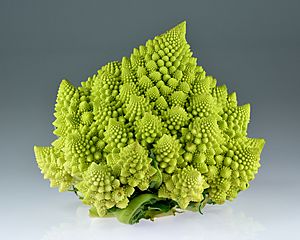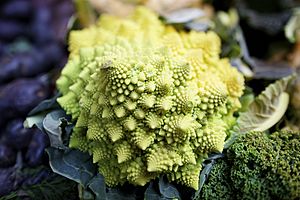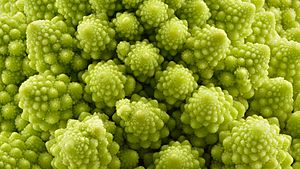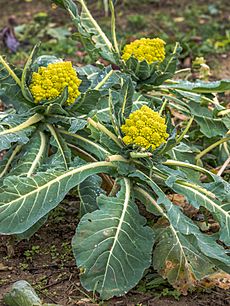Romanesco broccoli facts for kids
Quick facts for kids Romanesco |
|
|---|---|

Romanesco, showing its self-similar form
|
|
| Species | Brassica oleracea |
| Cultivar group | Botrytis cultivar group |
Romanesco broccoli (also known as Roman cauliflower, Broccolo Romanesco, Romanesque cauliflower, or simply Romanesco, and sometimes Broccoflower) is an edible flower bud of the species Brassica oleracea. First documented in Italy in the 16th century, it is chartreuse in color, and has a form naturally approximating a fractal. When compared to a traditional cauliflower, it has a firmer texture and delicate, nutty flavor.
Description

Romanesco superficially resembles a cauliflower, but it is chartreuse in color, with the form of a natural fractal. Nutritionally, romanesco is rich in vitamin C, vitamin K, dietary fiber, and carotenoids.
Fractal structure
The inflorescence (the bud) is self-similar in character, with the branched meristems making up a logarithmic spiral, giving a form approximating a natural fractal; each bud is composed of a series of smaller buds, all arranged in yet another logarithmic spiral. This self-similar pattern continues at smaller levels. The pattern is only an approximate fractal since the pattern eventually terminates when the feature size becomes sufficiently small. The number of spirals on the head of Romanesco broccoli is a Fibonacci number.
The causes of its differences in appearance from the normal cauliflower and broccoli have been modeled as an extension of the preinfloresence stage of bud growth. A 2021 paper has ascribed this phenomenon to perturbations of floral gene networks that causes the development of meristems into flowers to fail, but instead to repeat itself in a self-similar way.
de:Blumenkohl#Formen und Typen
See also
 In Spanish: Romanesco o romicia para niños
In Spanish: Romanesco o romicia para niños



